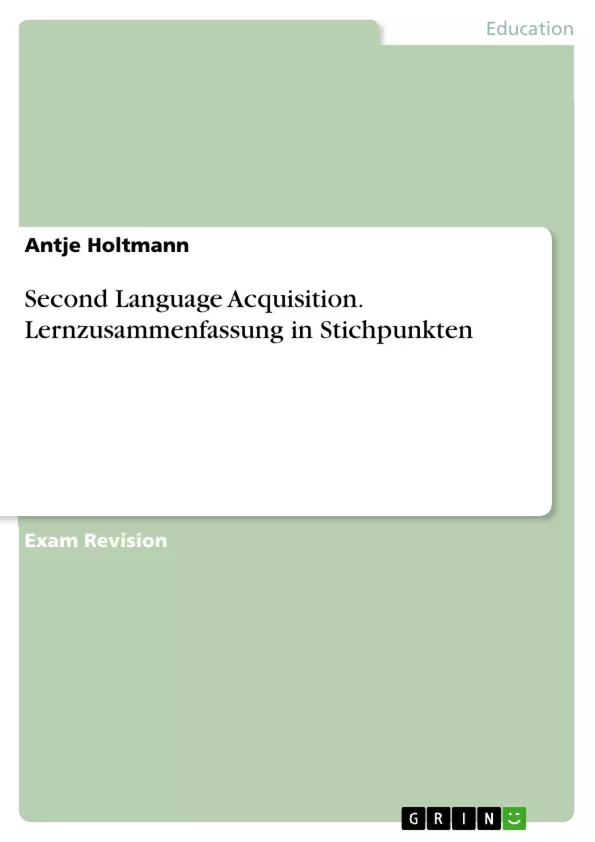Bei dieser Prüfungsvorbereitung handelt es sich um eine Lernzusammenfassung in Stichpunkten zum Thema Second Language Acquisition.
Inhaltsverzeichnis (Table of Contents)
- Chapter 1: Introduction
- Informal and formal SL learning
- Differences + similarities of languages
- Linguistic competence (knowledge) + performance (production)
- Cognitive processes (psycholinguistics)
- Multidisciplinary approach!
- Learning conditions => social, cultural, economic factors
- Chapter 2: Foundations
- Chapter 3: Linguistics
- Early Approaches
- Contrastive Approach
- Error Analysis
- Interlanguage
- Morpheme Order Studies
- Monitor Model
- Universal Grammar
- Functional approaches
- Systematic Linguistics
- Functional Typology
- Chapter 4: Psychology
- Organization in the brain
- Bilingualism
- Learning process
- Information Processing
- Competition Model
- Connectionist approach
- Differences
- Learning strategies
- Chapter 5: Social contexts
- Communicative competence
- L1 = part of socialization
- Language policies
- Access to education
- Acquisition of dominant L2 => loss of L1
Zielsetzung und Themenschwerpunkte (Objectives and Key Themes)
This text aims to provide an introduction to the field of Second Language Acquisition (SLA), exploring the various factors that influence the learning process. It delves into the historical development of SLA theories, examining the different approaches to studying language acquisition, and highlighting the crucial role of both linguistic and psychological elements. Key themes covered in the text include:- The interplay of linguistic competence and performance in second language acquisition
- The impact of social, cultural, and economic factors on language learning
- The role of innate capacity, motivation, and learning strategies in successful SLA
- The nature of interlanguage and its development in the learning process
- The influence of the first language on second language acquisition
Zusammenfassung der Kapitel (Chapter Summaries)
Chapter 1 introduces the fundamental concepts of Second Language Acquisition, exploring the differences and similarities between first and second language learning. It highlights the multidisciplinary nature of SLA, drawing upon insights from linguistics, psychology, and sociology. Chapter 2 delves into the motivations behind second language acquisition, examining factors such as conquest, communication needs, immigration, religious reasons, and education. It explores the challenges of estimating the number of multilinguals and the significance of language prestige and status in determining proficiency. Chapter 3 examines various linguistic theories and approaches to SLA, tracing their historical development. It covers the Contrastive Approach, Error Analysis, Interlanguage theory, Morpheme Order Studies, and the Monitor Model, highlighting their strengths, weaknesses, and contributions to the field. Chapter 4 focuses on the psychological aspects of SLA, exploring the organization of bilingualism in the brain, the learning process, and individual differences that influence acquisition. It examines theories of information processing, the Competition Model, and the connectionist approach to understanding how learners acquire a second language. Chapter 5 examines the social contexts that shape SLA, exploring the role of communicative competence, language policies, access to education, and the potential impact of second language acquisition on the maintenance of the first language. It highlights the interconnectedness of language learning with social and cultural factors.Schlüsselwörter (Keywords)
Key concepts and themes explored in this text include second language acquisition (SLA), linguistic competence, performance, cognitive processes, social, cultural, and economic factors, motivations for SLA, proficiency, bilingualism, interlanguage, error analysis, contrastive approach, Monitor Model, Universal Grammar, information processing, competition model, connectionist approach, communicative competence, and language policies.Frequently Asked Questions
What is Second Language Acquisition (SLA)?
SLA is the study of how individuals learn a language other than their native tongue, covering informal and formal learning environments.
What is the difference between linguistic competence and performance?
Competence refers to the underlying knowledge of a language, while performance refers to the actual production and use of that language in real situations.
What is the Monitor Model in SLA?
Developed by Stephen Krashen, it is a set of five hypotheses about second language acquisition, focusing on the balance between conscious learning and subconscious acquisition.
How do social contexts affect language learning?
Factors such as language policies, access to education, and social status significantly influence motivation and the level of proficiency a learner achieves.
What is "Interlanguage"?
Interlanguage is the idiosyncratic language system created by a learner which is neither the first language nor the target language, but a transitional stage between them.
What are the psychological aspects of SLA?
These include how the brain organizes bilingualism, information processing, and individual differences like learning strategies and cognitive styles.
- Citation du texte
- Antje Holtmann (Auteur), 2014, Second Language Acquisition. Lernzusammenfassung in Stichpunkten, Munich, GRIN Verlag, https://www.grin.com/document/277970



